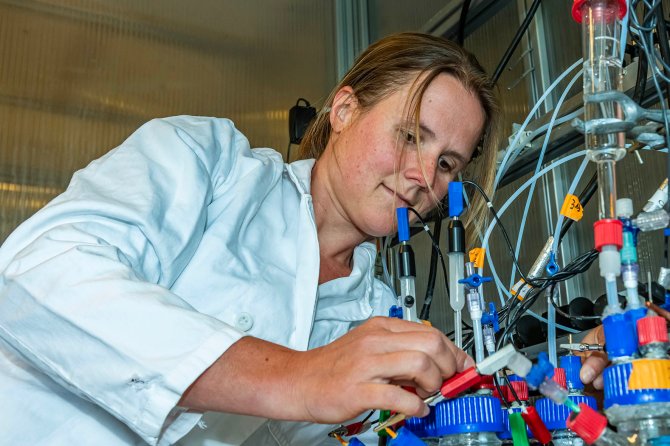
News
Change of leadership at ETE
Annemiek ter Heijne succeeds Cees Buisman as new Chair Holder
On July 1st, Annemiek ter Heijne, Associate Professor at ETE, has replaced Cees Buisman as Chair Holder (Bio)recovery Technology for Circular Economy. Buisman has been Chair for over 20 years. He will continue as personal Professor at ETE for one day a week.
Ter Heijne has been employed by ETE for almost 17 years. After her PhD at ETE in 2006-2010, where she developed the microbial fuel cell as an innovative technology to recover electricity from wastewater, she continued to focus on Microbial Electrochemical Technologies,wheremicroorganismsinteract with electrodes. Thesesystemscan be used to recover valuable resources, like nutrients, metals,and energy, from wastewater.
New leadership role
In her new role as Chair Holder, ter Heijne will face quite some changes in her activities: together with the other chair at ETE, she will function as some kind of general manager of the group, she will be responsible for the research activities in the field of biorecovery technologies at the department and co-responsible for the education program of ETE.In addition, she will also oversee the functioning of the laboratories,as well as personnel management. Ter Heijne: ‘I will continue to supervise PhD students in my own expertise area, but will also become involved in new research topics in the field of biorecovery technologies.’ In due time, she hopes to have support from a new colleague, who will replace retiring Professor Huub Rijnaarts, the other chair holder of ETE.
Overall research vision
ETE has grown enormously the last 10 years. Ter Heijne believes that consolidation of the large group of researchers and support staff is the first priority. In her new position, ter Heijne aims to increase her contribution to different research fields. ‘Currently, I have a strong focus on resource recovery and pollutant removal from wastewater, using a combination of microorganisms and electricity’, she explains. ‘As the new chair, I would like to contribute more to other excellent and relevant research lines we already have at ETE. Together with the researchers in my group, I will develop an overall research vision of our chair, aimed at nutrient recovery, pollutant removal, degradation of plastics, recycling of bio-plastics, and using CO2 as a raw material for fuel or chemicals.’ In all these research topics, microorganisms often play a central and crucial role.
Boost collaboration and communication
For most of ETE’s research, the smooth operation of the laboratories is of paramount importance. Therefore, ter Heijne wants to boost the collaboration and communication between the lab team, that is responsible for all lab operations, and the researchers. ‘We could for example work more together to develop new methods’, she explains. ‘This way we benefit from the specific knowledge of both the lab team and the researchers, resulting in more efficient and optimal results.’

Teaching: more attractive and appealing
Another important goal of ter Heijne’s is to make the BSc program of the Department of Environmental Sciences more attractive and appealing for students. She feels there should be more focus on the student’s motivation and personal development, and a change in the current BSc program is needed. Therefore, she is already part of a committee that aims to redesign this BSc program of Environmental Sciences. ‘Currently, the first year of the BSc is dominated by a lot of basic courses, where the context of the course often is lost’, she explains. ‘That may discourage and demotivate students. Therefore, we’d like to include more applied courses in the program, starting already during the first year. This puts the basic courses more in a context and illustrates how to incorporate and apply that fundamental knowledge into practice.’
Artificial Intelligence
But ter Heijne also keeps a close eye to new developments in the scientific field, while she is particularly fascinated by the rise of artificial Intelligence (AI): how to deal with that powerful development in science and education? ‘I think AI can be a great contribution if used properly, especially in writing. For example, Chat GPT can be great writing tool, since it can supply the student with a basis, a general starting point for a writing assignment’, she states. ‘It may also help to structure texts, and help to write a coherent piece with good connections between the different paragraphs.’ To what extent these tools can be used in research, is still a topic to be explored. As a group, but also as WUR, we need to develop a vision and strategy on how to use the benefits of AI, while being aware of the setbacks.
Good working environment
Although the new position is an important step in her career, she is down to earth and puts it all into perspective. Crucial to her is being healthy and happy, while having a good balance between work and private life. In that context, she highly values a good working environment for all employees. ‘Our group should be a place where people feel safe and where all employees feel heard and appreciated’, she says. ‘To achieve this, it is very important for me to lead by example.’
But her main drive is to make the world a better place. Ter Heijne: ‘I try to do that partly through my work, by motivating people, while putting the right person at the right place. But also, environmental technologies are important tools to contribute to a more sustainable society. For example, by developing techniques to recover materials, we can avoid depleting the earth and move towards a circular society.’